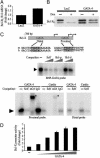Essential role of GATA-4 in cell survival and drug-induced cardiotoxicity
- PMID: 15100413
- PMCID: PMC406451
- DOI: 10.1073/pnas.0401833101
Essential role of GATA-4 in cell survival and drug-induced cardiotoxicity
Abstract
In recent years, significant progress has been made in understanding cardiomyocyte differentiation. However, little is known about the regulation of myocyte survival despite the fact that myocyte apoptosis is a leading cause of heart failure. Here we report that transcription factor GATA-4 is a survival factor for differentiated, postnatal cardiomyocytes and an upstream activator of the antiapoptotic gene Bcl-X. An early event in the cardiotoxic effect of the antitumor drug doxorubicin is GATA-4 depletion, which in turn causes cardiomyocyte apoptosis. Mouse heterozygotes for a null Gata4 allele have enhanced susceptibility to doxorubicin cardiotoxicity. Genetic or pharmacologic enhancement of GATA-4 prevents cardiomyocyte apoptosis and drug-induced cardiotoxicity. The results indicate that GATA-4 is an antiapoptotic factor required for the adaptive stress response of the adult heart. Modulation of survival/apoptosis genes by tissue-specific transcription factors may be a general paradigm that can be exploited effectively for cell-specific regulation of apoptosis in disease states.
Figures







Similar articles
-
Peritoneal dialysate effluent during peritonitis induces human cardiomyocyte apoptosis by regulating the expression of GATA-4 and Bcl-2 families.J Cell Physiol. 2011 Jan;226(1):94-102. doi: 10.1002/jcp.22309. J Cell Physiol. 2011. PMID: 20625998
-
Regulation of cardiac myocyte apoptosis by the GATA-4 transcription factor.Life Sci. 2004 Feb 27;74(15):1829-38. doi: 10.1016/j.lfs.2003.10.002. Life Sci. 2004. PMID: 14761664 Review.
-
Transcription factor gata4 regulates cardiac BCL2 gene expression in vitro and in vivo.FASEB J. 2006 Apr;20(6):800-2. doi: 10.1096/fj.05-5426fje. Epub 2006 Feb 9. FASEB J. 2006. PMID: 16469847
-
MicroRNA-208a Silencing Attenuates Doxorubicin Induced Myocyte Apoptosis and Cardiac Dysfunction.Oxid Med Cell Longev. 2015;2015:597032. doi: 10.1155/2015/597032. Epub 2015 Jun 7. Oxid Med Cell Longev. 2015. PMID: 26137188 Free PMC article.
-
GATA transcription factors in the developing and adult heart.Cardiovasc Res. 2004 Aug 1;63(2):196-207. doi: 10.1016/j.cardiores.2004.03.025. Cardiovasc Res. 2004. PMID: 15249177 Review.
Cited by
-
Weekly doxorubicin increases coronary arteriolar wall and adventitial thickness.PLoS One. 2013;8(2):e57554. doi: 10.1371/journal.pone.0057554. Epub 2013 Feb 21. PLoS One. 2013. PMID: 23437398 Free PMC article.
-
Drug Development and the Use of Induced Pluripotent Stem Cell-Derived Cardiomyocytes for Disease Modeling and Drug Toxicity Screening.Int J Mol Sci. 2020 Oct 3;21(19):7320. doi: 10.3390/ijms21197320. Int J Mol Sci. 2020. PMID: 33023024 Free PMC article. Review.
-
GATA transcription factor required for immunity to bacterial and fungal pathogens.PLoS One. 2006 Dec 20;1(1):e77. doi: 10.1371/journal.pone.0000077. PLoS One. 2006. PMID: 17183709 Free PMC article.
-
Enhanced expression of transcription factor GATA-4 in inflammatory bowel disease and its possible regulation by TGF-beta1.J Clin Immunol. 2009 Jul;29(4):444-53. doi: 10.1007/s10875-009-9292-x. Epub 2009 Apr 8. J Clin Immunol. 2009. PMID: 19353247
-
Ageing is a risk factor in imatinib mesylate cardiotoxicity.Eur J Heart Fail. 2014 Apr;16(4):367-76. doi: 10.1002/ejhf.58. Eur J Heart Fail. 2014. PMID: 24504921 Free PMC article.
References
Publication types
MeSH terms
Substances
LinkOut - more resources
Full Text Sources
Other Literature Sources
Molecular Biology Databases
Research Materials

